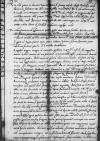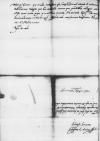A multo iam tempore nihil ad Reverendissimam Dominationem Vestram scripsi et argumentis, et nuntiis carens. Nunc, cum magnificus dominus ⌊Sigismundus ab Herberstein⌋ hisce adiunctas ⌊domino Byecensi⌋ transmisit et ille easdem per me ad Reverendissimam Dominationem Vestram mitti voluit, hanc e(tiam)(?) scribendi occasionem negligere nolui.
De rebus per ⌊Romanorum caesarem⌋ in ⌊Gallia⌋ gestis non attinet scribere. Equidem credo illic feli ms. o(!)
⌈ii ms. o(!)
⌉cius pervenire omnia. Quae hactenus acta sunt, videntur sumptibus et bonorum militum iacturae non respondere, tametsi satis feliciter factum creditur, si ⌊Gallorum rex⌋ pacem, quam petere videtur, sequetur, foedera sincerius, quam hactenus, servans. Qua in re a multis dubitatur.
⌊Anglorum regem⌋ magno cum exercitu ⌊Galliam⌋ ingressum referunt et ingressum tantum. Nihil etenim ad nos pervenit memorabile gestum pecuniarum, hominum et temporis praeter. Belli nominis gloriam dicere non audeo et puto nunc hac de re dominum ⌊Sigismundum⌋ nonnihil attingere, certiora etenim in regia aula sunt omnia. In ⌊Hungaria⌋ mense Septembre bis cum ⌊Thurcis⌋ pugnatum est feliciter, primo a ⌊Strigonio⌋ milliari uno ⌊Leonardus a Vels⌋ Thurcas ad praedandum proficiscentes invasit et prostravit fugavitque. Paulo post ⌊Thurcae⌋ circiter mille octingenti equites et pedites iter versus montana ⌊Bistriciam⌋, ⌊Schemniciam⌋, ⌊Kremniciamque⌋ praedaturi ingressi et, dum in ditionem Balassorum, ⌊Hungar(iae)⌋ procerum, venissent, iam praedam hominum pecudumque legentes cogentesque, Balassius ex fratribus alter, vir sane strenuus, cum t ms. c(!)
⌈tt ms. c(!)
⌉recentis equis palantes invasit totam diem [...] paper damaged⌈[...][...] paper damaged⌉lariter certans plurimos et equites, et pedites ex locorum cognitione per en[...] paper damaged⌈[...][...] paper damaged⌉ ipsam ferme noctem fessus multis ex suis sauciis et ipse tribus confossus vulneribus ex proelio in arcem se quandam recepit. Ita hostes onusti praeda abire cum spoliis coeperunt. His obvii venerunt Ferdinandiani 1100 equites, ad quos rumor ⌊Thurcarum⌋ profectionis pervenit. De novo proelium instaurant. Fugiunt imprimis equites relictis peditibus, ianicaris ac martolossiis, gente pessima et crudeli. Illi per Ferdinandianos ad unum caesi sunt omnes et, qui ⌊Strigonium⌋ versus fugam ineunt, per insequentes aut capti, aut necati sunt. Elapsis, ut creditur, ex omnibus ad quadringentos, ita recuperatis captivis cum praeda omni, Christiani ad sua redirent. Irritati vero ⌊Turcae⌋ dicuntur nunc irruptionem magna vi in Ferdinandianos parare. Domino supplicamus, ut propter magnum ipsius nomen et semet ipsum suos redimere velit.  AAWO, ABD, 6, f. 59v Dum ad crucem, quae in alia cartae facie est, scripsissem, accurrit e ⌊Wienna⌋ tabellarius regius, qui haec attulit nova, quae praesentibus adligavi. Utinam hidden by binding⌈[am]am hidden by binding⌉ vel sic coeat certa pax pro victoria incerta.
AAWO, ABD, 6, f. 59v Dum ad crucem, quae in alia cartae facie est, scripsissem, accurrit e ⌊Wienna⌋ tabellarius regius, qui haec attulit nova, quae praesentibus adligavi. Utinam hidden by binding⌈[am]am hidden by binding⌉ vel sic coeat certa pax pro victoria incerta.
Dominus Reverendissimam Dominationem Vestram diu incolumem et me in gratia Reverendissimae Dominationis Vestrae conservare dignetur.
 AAWO, ABD, 6, f. 59v Dum ad crucem, quae in alia cartae facie est, scripsissem, accurrit e
AAWO, ABD, 6, f. 59v Dum ad crucem, quae in alia cartae facie est, scripsissem, accurrit e 
